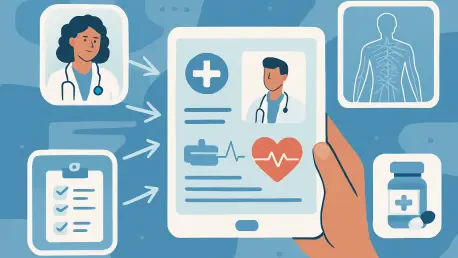In an era where digital convenience shapes consumer expectations across industries, healthcare is undergoing a remarkable transformation with tools designed to match the ease of everyday technology. Kaiser Permanente has emerged as a leader in this shift with the introduction of the Kaiser Permanente Intelligent Navigator (KPIN), an innovative platform powered by artificial intelligence (AI) and natural language processing (NLP). Highlighted in a recent study published in Nature and conducted by the Southern California Permanente Medical Group, KPIN is redefining how patients engage with healthcare services through a seamless digital portal. The platform’s mission is to simplify navigation, reduce delays in accessing care, and offer highly personalized interactions that cater to individual needs. By moving beyond the limitations of traditional systems, KPIN sets a new standard for digital healthcare, promising to enhance patient satisfaction and outcomes through cutting-edge technology.
Transforming Digital Access to Care
The growing demand for intuitive, user-friendly healthcare experiences mirrors the way people interact with technology in other facets of life, such as using smartphone apps for navigation or shopping. Unfortunately, conventional patient portals often disappoint, presenting generic options that fail to address specific concerns and frequently redirecting users to call centers for further assistance. KPIN tackles these shortcomings head-on by enabling patients to articulate their needs in their own words through a digital interface. Leveraging AI, the system interprets this input and delivers customized solutions that feel far more relevant and engaging. This personalized approach not only saves time but also builds trust in the healthcare process, as patients feel understood rather than funneled through a one-size-fits-all system. The result is a digital experience that aligns more closely with modern expectations for convenience and efficiency.
Another key advancement lies in KPIN’s ability to overcome the rigidity of older healthcare navigation tools. Traditional systems often force patients to select from predefined menus, which can lead to mismatched care options or heightened frustration when the right path isn’t clear. In contrast, KPIN functions as a smart entry point, using NLP to process free-text descriptions of symptoms or needs. With a success rate of 50% in directing patients to the correct appointment—compared to the industry average of just 33%—this technology significantly reduces trial and error. Patients are guided to appropriate care teams or services more effectively, ensuring that their journey through the healthcare system starts on the right foot. This innovation highlights how AI can streamline access while addressing the unique challenges each individual faces when seeking medical attention.
Enhancing Urgency and Precision in Care
One of KPIN’s most impressive capabilities is its knack for identifying urgent medical situations with exceptional accuracy. Achieving a remarkable 97.7% accuracy rate in detecting high-acuity cases, the platform ensures that patients who need immediate attention are promptly triaged to the right level of care. This feature is critical in preventing delays that could worsen health outcomes, especially for those with pressing conditions. By prioritizing urgency, KPIN not only safeguards patient well-being but also optimizes resource allocation within the healthcare system, ensuring that critical cases receive the attention they deserve without overwhelming providers. Such precision underscores the potential of AI to act as a lifesaving tool in digital healthcare navigation, setting it apart from less responsive traditional models.
Beyond urgency detection, KPIN excels in recommending tailored care pathways with an accuracy of 88.9%, further minimizing delays and enhancing overall results. This high level of precision means that patients are less likely to be routed to unnecessary appointments or incorrect departments, which often happens with older, less sophisticated systems. Instead, the platform analyzes input to suggest the most suitable next steps, whether that involves scheduling with a specialist or accessing virtual care options. This capability reduces the burden on both patients and healthcare staff by cutting down on missteps and redundant interactions. The focus on accurate guidance reflects a broader commitment to improving the quality of care through technology, ensuring that each patient’s journey is as smooth and effective as possible while maintaining a high standard of medical appropriateness.
Integrating Technology with Clinical Expertise
While KPIN showcases the power of automation in healthcare navigation, it remains firmly grounded in the importance of human expertise. As emphasized by Dr. Khang Nguyen of the Southern California Permanente Medical Group, AI serves as a supportive mechanism rather than a substitute for doctors and care teams. The platform’s development and ongoing refinement depend heavily on input from physician subject matter experts who train the AI models to align with clinical best practices. This collaboration ensures that the technology enhances rather than undermines the decision-making process, maintaining a balance between innovation and established medical standards. Patient safety remains paramount, with the system designed to complement the nuanced judgment that only experienced professionals can provide.
Additionally, the success of KPIN hinges on a multidisciplinary approach that incorporates continuous feedback from frontline healthcare workers, including nurses and operational staff. This iterative process allows the platform to adapt to real-world challenges and evolving patient needs, ensuring its recommendations remain relevant and trustworthy. By involving diverse perspectives from across the healthcare spectrum, KPIN avoids the pitfalls of over-reliance on technology, instead fostering a symbiotic relationship between AI and human insight. Such collaboration not only bolsters the system’s credibility but also reinforces the idea that technology in healthcare must always prioritize patient-centered care. The result is a tool that empowers providers while delivering meaningful improvements to the patient experience.
Scaling a Digital-First Healthcare Vision
The rollout of KPIN to 4.9 million patients in Southern California since October 2024 marks a monumental step toward a digital-first healthcare model. Unlike typical portals that often redirect users to phone support for unresolved issues, KPIN completes the digital encounter by offering personalized recommendations directly within the platform. This capability eliminates unnecessary steps, allowing patients to resolve their needs without leaving the digital space. The sheer scale of this implementation demonstrates the platform’s potential to transform healthcare access for vast populations, proving that AI-driven solutions can be both impactful and sustainable on a large scale. This shift signals a future where digital tools play a central role in making healthcare more accessible and responsive.
Moreover, KPIN’s scalability reflects a strategic vision to address systemic inefficiencies in healthcare delivery. By handling millions of interactions seamlessly, the platform reduces the strain on call centers and administrative staff, freeing up resources for more complex cases that require direct human intervention. This efficiency not only benefits patients through faster service but also supports healthcare organizations in managing high volumes of demand without compromising quality. As digital adoption continues to grow, KPIN serves as a blueprint for how technology can reshape patient navigation at scale, offering a glimpse into a future where digital-first strategies become the norm rather than the exception. The focus remains on creating a system that works for everyone, regardless of the size of the population served.
Paving the Way for Consumer-Centric Healthcare
The broader movement toward consumer-focused healthcare is evident in the way digital tools are being leveraged to meet rising expectations for ease and customization. KPIN embodies this trend by addressing the inadequacies of traditional portals, which often leave patients feeling unheard or lost in a maze of options. Through AI and NLP, the platform interprets individual needs more naturally, providing a level of personalization that feels intuitive and user-friendly. This shift not only improves satisfaction but also builds confidence in digital healthcare solutions, encouraging wider adoption among diverse patient groups. The emphasis on tailoring experiences to match consumer standards sets a compelling precedent for the industry to follow.
Looking back, the deployment of KPIN illustrates a pivotal moment in aligning healthcare with modern demands, as it successfully integrates advanced technology to enhance accessibility and responsiveness. Reflecting on its impact, the next steps involve exploring how such platforms can further evolve to address emerging challenges, like integrating with wearable health devices or expanding language support for broader inclusivity. Healthcare providers and tech innovators are encouraged to build on this foundation, focusing on continuous improvement through patient feedback and clinical collaboration. By prioritizing scalability and adaptability, the future of digital healthcare can continue to advance, ensuring that innovations like KPIN remain at the forefront of delivering exceptional care experiences.









